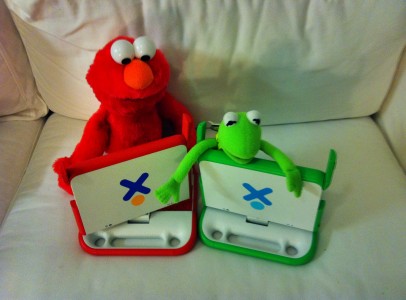La Rioja, Argentina
I am writing from the Airport of La Rioja, with my blue XO, waiting for my delayed plane to Buenos Aires. I spent this morning with the Minister of Education, professor Walter Flores and his team, visiting two elementary public schools. Today the whole province is celebrating a significant event, every child and teacher is showing their work on their XO, more than 50,000 have been already distributed. Un dÃa con mi XO, is the title of this very peculiar Journey. A very impressive experience indeed, a massive celebration, the first ever, I think, in the OLPC world. An incredible feat for this Argentine province, the first in Argentina to have saturated the whole educational system, in elementary and special schools with the XO laptops, private and public, and also the secondary and technological schools with the Intel netbooks. A detail, the XO were bought by the province and the netbooks by the nation. A perfect solution.
In La Rioja both platforms coexist in great harmony, due in fact that the leaders of the XO team with their expertise are also in charge of the netbook implementation in the secondary schools. A good model to follow in other settings for a smooth transition when the children finishing primary school return their XO (to be recycled and given to the new cohort in first grade) and receive instead their new netbook for the secondary school. In fact in many families children and adolescents use both equipments in the «expanded school» at home and outside, in the public places with wifi. A new digital landscape is unfolding. I have seen a remarkable video of a show with hundreds of children walking on the streets of La Rioja by night with their XO shining like candles in the dark.
It was really moving to see today the schools transformed in an immense XO laboratory. Classrooms, yards, gardens, corridors were blooming with the green laptops and hundreds of children with their parents and teachers around. The media followed the visit of the Minister who gave several interviews. I also was interviewed working with the children who were fascinated with my blue machine and …my white hat. I was impressed with the immediate reaction of the students. Many wanted to have my blue XO and some told me that the blue keyboard was much better. I agree. One discovered that I had a new program to «play games with numbers». In fact we will test it in the next weeks in some schools of La Rioja. It is a remarkable software produced by a team at the University of Buenos Aires under the leadership of Mariano Sigman, a member of the scientific advisory board of OLPCA. If the result is satisfying we will distribute it to the whole OLPC community around the world.
A continuous flow of information came from remote parts of the province, all the 380 elementary schools were today performing a fantastic concert of digital ideas. A day to be remembered as the celebration of the program Joaquin V. Gonzalez, who started only one year ago and now has fully integrated the whole province, every child without exception, in the digital world. I hope La Rioja will become a leader in the Andean region and we discussed with Minister Flores the possibility of expanding the XO experience to the near province of Catamarca and even to Atacama in Chile.
At OLPC we are educators without borders.

